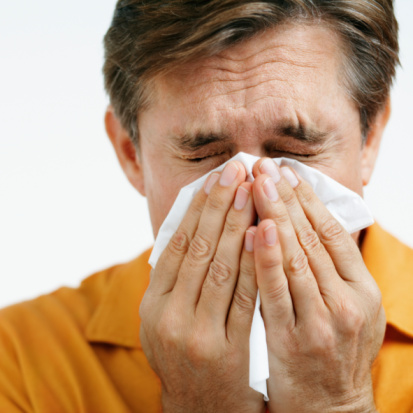 It’s April and if you’re lucky, you made it through the fiercest portion of flu season unscathed. Although cases are still being reported and there is still a slight risk for contraction, the bulk of the threat has dissipated by this point.
It’s April and if you’re lucky, you made it through the fiercest portion of flu season unscathed. Although cases are still being reported and there is still a slight risk for contraction, the bulk of the threat has dissipated by this point.
Typically, the flu affects the young and old. Babies, toddlers, children and senior citizens contract the bulk of cases, while most adults have little risk. New numbers out of California, however, show that the age cohort from 41 to 65 racked up the most flu-related hospital visits and deaths this year. So if you’re a middle-aged adult, it’s time to get a little more serious about how the flu can affect you.
Surely you’ve suffered through a few bouts with the flu in your day and don’t think it’s anything to worry about. But suffering a flu at 16, 21, or 34 can be quite different than suffering one at 55. Once you get older, you can’t afford to brush it off anymore.
Middle-aged Americans often avoid the flu shot, and although the data was only collected in California (one of the only states that monitors and tracks flu-related deaths in adults) it is a good barometer for what’s likely happening nationally. While 41% of children and 52% of seniors got flu shots, only 34% of middle-aged adults got the shot. This nonchalant attitude is reflected in the health problems this cohort experienced this year.
Now, I understand the flu shot isn’t for everybody, but I am an advocate of it. It is very hard to defend yourself from the flu because it can be contracted seemingly anywhere, and almost everybody is at risk. Of course, there are natural prevention methods you can use to lower the chances of getting the flu before the season officially ends.
One of the most important things you can do to lower your chances of contracting the H1N1 virus (the most common influenza strain this year) is to wash your hands thoroughly and regularly with soap and water. It may seem excessive, but washing when you arrive somewhere, when you leave, and upon returning home is highly recommended. Using warm water and soap and thoroughly scrubbing can remove the bacteria from your hands and prevent the virusfrom spreading to your face where it can infect more easily. If you can’t get to the sink, it’s recommended you at least carry a hand sanitizer—but use soap and water when available.
It’s also important to be well rested and eat a healthy diet. When you’re tired and eat poorly, your body is more susceptible to infection because of a vulnerable immune system. So try getting to sleep early, find ways to relieve stress, and eat a diet that mainly comprises of vitamin-rich fruits, vegetables, and antioxidants and lean meats. The better prepared your body is to fight intruders, the better your defense can be.
It’s also important to avoid sick people. This can be hard because people take it everywhere they go and you really can’t isolate yourself completely. For example, you still need to go to the grocery store and to your job, so be conscious of who’s around you. Don’t get in line behind a person coughing or sniffling or schedule a face-to-face meeting with someone who sounds or looks sick. If someone in your family gets sick, try to keep them relatively quarantined.
You’re not immune from the flu, so be conscious of how you prepare for it.
Source:
Chia, J., “Middle-Aged Adults Most Likely to Die From Flu,” Prevention web site, March 2014; http://www.prevention.com/health/health-concerns/flu-complications-middle-aged-adults, last accessed April 1, 2014.
